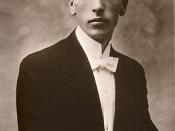In the passage, composer Igor Stravinsky describes orchestra conductors by using rhetorical devices and detailed language to convey his feelings on the subject. He is obviously unimpressed with the "skill"ÃÂ that conductors are praised for and cynical of their talent in general. The author uses bitter metaphors and pessimistic language to perceptibly make his opinion known.
The author frequently compares conductors to politicians in the first paragraph. In the first sentence he makes his first strike with the comment "Conducting, like politics, rarely attracts original minds."àWith this comment, his position on the issue is clearly stated. By using politics, a subject often looked down on, as comparison to conducting, he automatically portrays conducting in a negative connotation. He also dismisses the talent of the conductors with the comment; "A conductor may actually be less well equipped for his work than his players"æ"àThis implies that conductors have no real knowledge of music; they just stand in front of the talent, soaking up the credit by using "power politics."ÃÂ
The author is obviously trying to expose the faÃÂçade of conducting.
The language the author chose to use also greatly expresses his disdain for conductors. Phrases used, such as, "the disease grows like a tropical weed"æ"àused to describe the progression of the conductors ego, depicts again a negative connotation to the reader. The author then continues on to say that conductors begin to falsely believe that they are greater than they really are, a result of the "disease."àThey become "egotistical"àand "arbitrary authority."àThe implication of these words is that the author is resentful towards conductors that do nothing to earn their way, but magically climb to the top. He is sarcastically repeating the comments about "great conductors,"àmaking it known that he feels differently by using quotations around the word "great"àvirtually every time it is used, thus poking fun at the so called "great conductors."àSequentially, the author then turns and relies on the reader to get his point across. He points that if you are "incapable of listening"àthe conductor will "show you what to feel"àagain poking fun at another thing conductors are at fault for, taking away from the music. These comments show that the author feels invaded by the presence of conductors, as if they are distracting and imposturous. And, in the final opportunity to persecute conductors, the author simply advises the reader not to go to a concert, for the conductors will surely ruin the experience.





